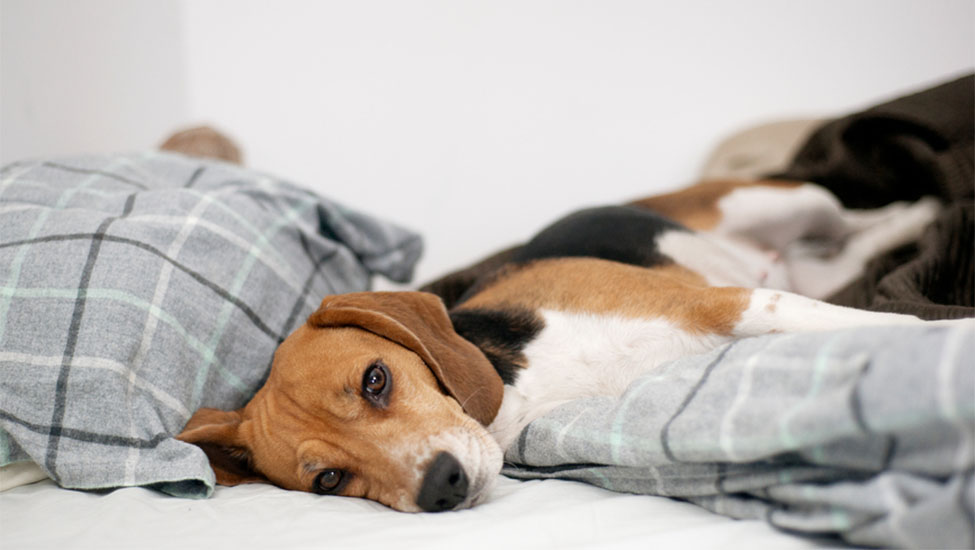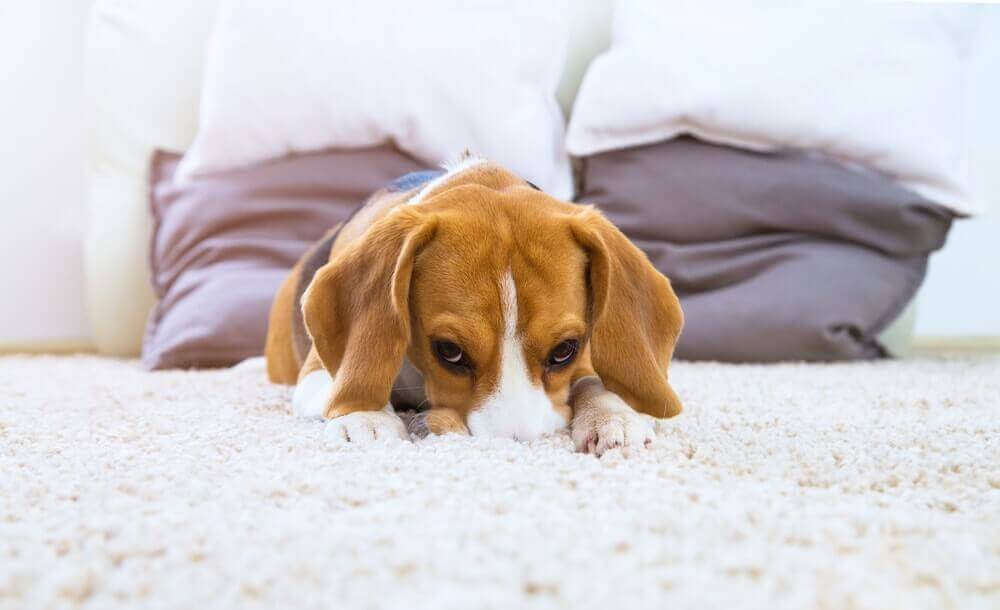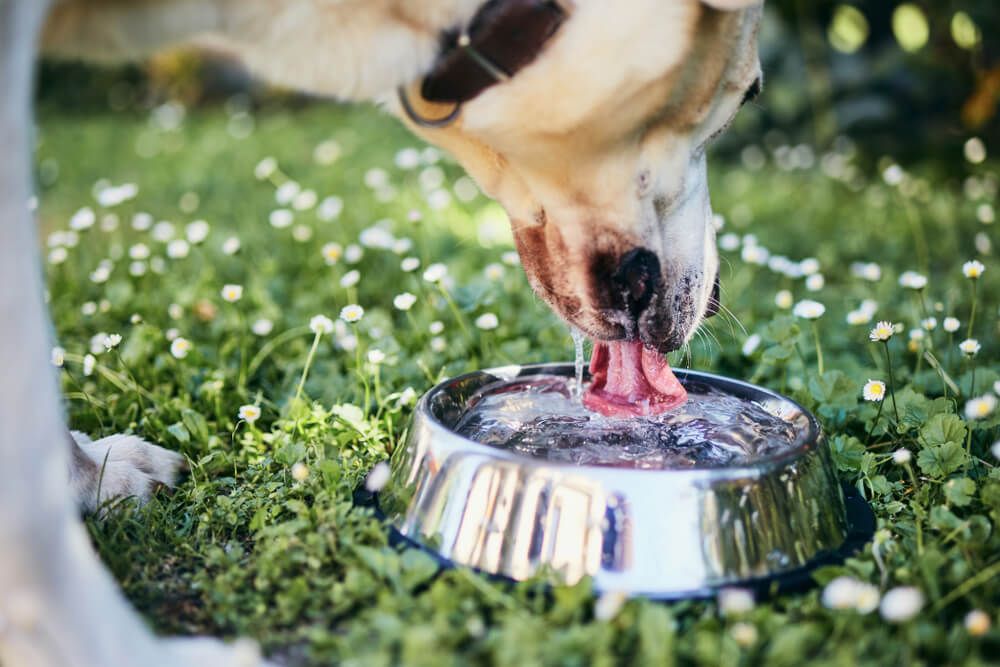Hey Ollie blog readers! We’re offering you an exclusive 60% OFF your starter box! Try now!
Your normally happy-go-lucky pup grimaces, whimpers, and heads into a corner. Then you spot it: The remains of the dinner he wolfed down earlier. Even if he’s smiling, tail-thumping (and yup, trying to eat the vomit seconds later) seeing your dog get sick is always a disconcerting experience for pet parents. Vomit can be a result of many things, from a pup who indulged too much at a humans-only picnic to a more serious condition. We spoke with Maranda Elswick, a veterinarian and founder of The Meowing Vet, to find out how to handle it healthily:
Sniff out the situation
Does your pup slurp down a bunch of ice cubes, only for them to come back up right away? While unpleasant, this is known as “regurgitation.” It’s not vomit, and an occasional episode is NBD. “Regurgitating food or liquid occurs when ingested food never reaches the stomach,” explains Elswick. Very cold foods or eating too fast may trigger this effect. Active vomiting causes abdominal constrictions and may occur hours after your pup has eaten.
Do some more digging
Throwing up isn’t always an indication that something is wrong with your pup. “Some types of vomiting episodes are not particularly worrisome and resolve without treatment,” says Elswick. So assess any recent changes in your dog’s routine: Did your pup eat table food or go on a long car ride? These could be contributing factors. If your pup otherwise seems happy and has a fairly normal appetite, the vomiting episode is considered ‘self-limiting’ and he’s likely fine. Still, it never hurts to check with your vet.
Take away triggers
After the first bout of vomiting, clean up the mess as fast as you can so your pup isn’t tempted to eat it. Take away her food bowl and remove her water bowl, as well—guzzling too much H20 can irritate your pup’s GI tract even further. Instead, offer a few laps or ice cubes every few hours, suggests Elswick.
Give some belly rubs
“Gently rubbing his or her abdomen when your dog has an “upset tummy” may provide some comfort,” says Elswick. It can also help clue you into a more serious issue: “If your dog acts very painful or yelps when you gently touch the abdomen, take your dog to the vet for further examination as pancreatitis, gastric ulcers, intussusception, or obstructing foreign bodies can be particularly painful causes of vomiting,” she explains.
Reintroduce food slowly
You’ve likely heard of the BRAT diet—bananas, rice, applesauce, toast—as a common diet for humans to follow after a bout of GI distress. Dogs can also benefit from a variation: Boiled chicken (no seasonings or skin) and rice is gentle on the GI tract, says Elswick. Introduce this combination slowly. A small piece of ginger root or ginger powder sprinkled on food may also help soothe his stomach, although some pets don’t like the taste. If your pup doesn’t vomit after the first few feedings, it’s fine to go back to his normal food. Otherwise, consult your vet.
Consult the professionals
Of course, you should call the vet whenever you’re concerned, but there are a few cases when you should always contact them: it’s important to seek treatment if your pup is vomiting and you think he may have swallowed a foreign object, such as a sock or ball. Puppies and geriatric dogs are more susceptible to electrolyte imbalances due to dehydration, so they should be checked if the vomiting is more than a one-off episode. If your pup is urinating frequently, excessively thirsty, acting disoriented, if the vomit looks bloody or black, or if your pup has other medical issues like kidney disease, diabetes, liver disease or others, call your vet ASAP.
Assess your role
Since the majority of acute vomiting cases are caused by dietary indiscretion, many upset tummies can be avoided by not feeding your dog human foods that may induce GI upset. Things to avoid, according to Elswick: Rich, oily, greasy foods, fatty meats like ham, or fried foods. All can induce pancreatitis, an extremely painful inflammation of the pancreas that can cause vomiting.
Why is My Dog Throwing Up?
There are a number of reasons why your dog might be vomiting. The two most common reasons are that your dog ate grass or your dog ate his food too fast. Gary Weitzman, DVM, President of the San Diego Humane Society and author of the book The Complete Guide to Pet Health, Behavior, and Happiness says, “The number one reason is eating grass, but it’s not harmful. People think that dogs eat grass because their stomachs are upset, but they eat grass and that’s what upsets their stomachs.” Why do dogs eat grass? No good reason; they just like the smell.
The second most common cause of dog vomiting is eating too quickly. If your dog scarfs down his food occasionally, it’s not a concern. If this happens regularly, Weitzman says, “There’s a number of ways to slow them down, including food dispensing toys.” You can also space out their meals.
Other reasons your dog might throw up include:
- Eating fatty human foods.
- Change in diet.
- Ingesting a foreign object.
- Ingesting a toxin.
- Eating too fast.
- Taking a new medication.
- Pancreatitis.
- Viral or bacterial infections.
- Kidney disease.
- Liver disease.
- Heat stroke.
- Adrenal gland disease.
- Acute inflammation of the stomach (gastroenteritis)
- Parasites (whipworm and ringworm).
Dog Vomiting: When to Call the Vet
In most cases, your dog will stop throwing up fairly quickly. If a dog is vomiting, it’s best to withhold food for an hour or two to allow time for their digestive system to calm down. However, if it’s been over 12 hours and your dog is still throwing up, it’s time to call the vet. Look for these additional symptoms which might be cause for concern. If any apply, get in touch with your vet asap.
- Your dog seems lethargic or overly fatigued.
- Your dog’s vomit contains a fair amount of blood.
- You think your dog may have ingested a toxin or foreign object.
- Your dog’s abdomen looks bloated or is painful to the touch.
- Your dog is having trouble breathing.
Sara Ochoa, DVM, who practices in Texas, says, “Some conditions can be treated when they first occur but the longer you wait the less chance of saving your pet.” If you have an inclination that your dog is in distress, it’s best to contact your vet just in case.
The Ollie blog is devoted to helping pet parents lead healthier lives with their pups. If you want to learn more about our fresh, human-grade food, check out MyOllie.com.
Tagged As:

The nutrition your dog needs,
the food they want.

Enjoying our articles? Subscribe our Newsletters and get new articles directly to your inbox
You might also like
21 April 2025
10 MINS READ
Why Is My Dog Throwing Up White Foam? Causes & Treatments
While white foamy vomit in dogs is usually benign, there may be underlying health reasons why your pup is throwing up in the first place. Here’s everything you need to know about your dog throwin…
3 April 2025
8 MINS READ
Why Is My Dog Drinking A Lot of Water? Understanding Excessive Thirst in Dogs
Noticing your dog drinking more water than usual? Excessive thirst in dogs can be concerning and may indicate underlying health issues. In this article, we’ll explore the reasons behind increased w…
3 April 2025
6 MINS READ
Do Dogs Get Hiccups? Causes, Remedies & When to Worry
Wondering why your dog has the hiccups? Just like humans, dogs can experience hiccups—especially puppies. In this guide, we’ll explore the common causes of dog hiccups, how to help your pup fin…







